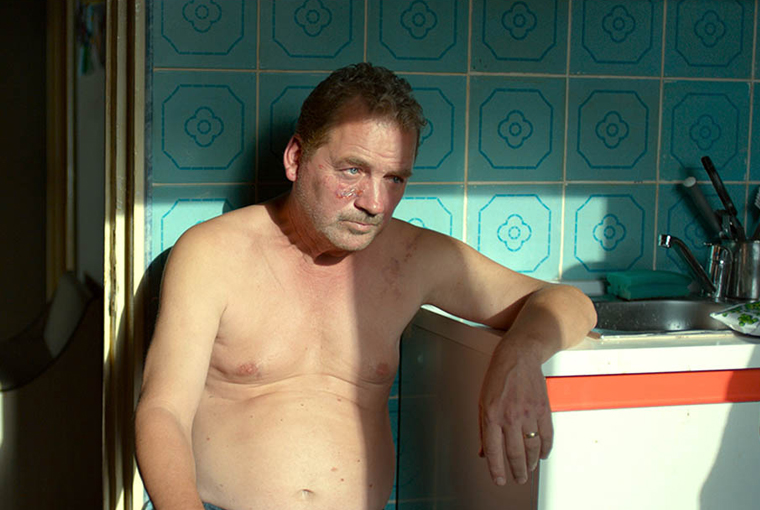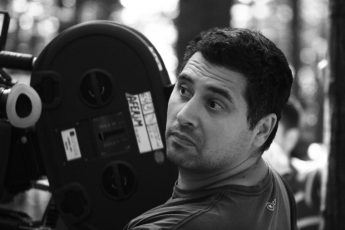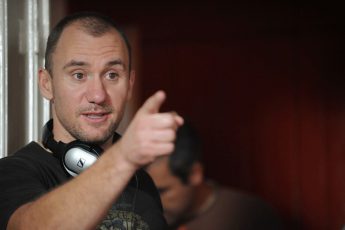The Minimalist Game
Radu Muntean’s One Floor Below (Un etaj mai jos, 2015)
Vol. 54 (June 2015) by Konstanty Kuzma
Radu Muntean is back with another minimalist drama that shuns narrative and stylistic enunciation. His masterfully executed One Floor Below revolves around a man who withholds key evidence from a police investigation and who struggles with his conscience as a result. The ordinary is where much of this film’s appeal lies, as Muntean’s acute observational skills once again prove able to invest us in the mundane routines of the everyday, though that premise only goes so far. The conflicts of Muntean’s characters never threaten to lash back at the viewer, who’s in a comfortable situation that’s at odds with Muntean’s wider ambitions of questioning the very basis of who we are.
Patrascu, played by the ever-persuasive Teodor Corban, is a master of efficiency. From the early mornings, when he takes his Labrador out for strolls, his phone allows him to be at two or three places at once. His job is to help people get their car registrations done, a self-employment which requires doing favors as well as asking for them and thus good relations to both clients and employees of various ranks and positions. Indeed, one is quickly impressed by Patrascu’s decency, which translates at home into his putting family above all else. (This marks a significant departure from Muntean’s earlier films Boogie and Tuesday After Christmas, where the quest for happiness was in part framed as one for extramarital sex partners.) A pot-bellied family man who reconciles benevolence with humility, Patrascu is a character we like to see studied, even if that means having to stand in queue with him or watch him stare off into empty space. Cinematographer Tudor Lucaciu’s wide-lens aesthetics and static visuals play their part in getting the most out of these “empty” sequences and resonate with Muntean’s previous films, though in comparison the interval between cuts has gone down just a notch.
Returning home one day, our protagonist listens in on a domestic quarrel his neighbors are having and is caught off guard when his neighbor Vali (Iulian Postelnicu) gets out of the apartment in just that moment. If we can forgive Patrascu’s curiosity and initial passivity – it can sure enough be hard to judge whether the sounds emitted during a quarrel are really signs of domestic violence –, a subsequent investigation unveils a casualty in that very apartment, which seems to be as pressing a reason to act as one can think of. It’s anybody’s guess why Patrascu keeps his discovery to himself regardless, especially after being questioned by the police. Shouldn’t Patrascu be happy to be approached by the police if he’s troubled to hear about his neighbor’s death? And wouldn’t sharing his knowledge be the most natural thing to do? Either way, Vali, Patrascu’s neighbor and the presumed murderer, starts to follow him around, asking him to help him with a car registration and winding up at his house to play video games with his computer-obsessed son. This makes for another series of observational sequences that raise the stakes for Vali, Patrascu, and ultimately Muntean himself, whose denouement proves he’s less talented at removing our apprehensions than at introducing them (I’ll spare you the spoiler).
Raising more questions than it answers, the film defines itself through what it is not, namely a work with clear-cut conflicts that are formulated, intensified and then resolved. In contrast, One Floor’s suspense partly lies in trying to find out what it is about, and it is clear from the beginning that Muntean is not the man to provide us with easy answers. Unlike his earlier films Boogie or Tuesday After Christmas, which lingered on in ambiguity throughout much of their screening time, One Floor does eventually follow through one of its narrative threads by settling around Patrascu’s struggles with his own conscience. It’s at this level that Muntean nominally seeks to “question the conception of morality,” and it’s also this higher level of abstraction, notoriously untypical for this director’s oeuvre, where the shortcomings of his approach become most visible. How should we identify with Patrascu’s obstinate behavior if we don’t know what drives it? And how does our identifying with him touch on our conception of morality? Isn’t a confession what Vali, the police and even Patrascu himself want? Though Muntean puts a lot of faith in his powers of disillusionment, the audience never learns what exactly Muntean is out to question: morality is a big word, perhaps too big to be addressed by Muntean’s tireless conjecturing machine. If good films threaten to shatter our deep-rooted beliefs, One Floor at best shakes them, leaving the viewer with no more than a pleasant buzz that disappears once our attention is drawn to something else.




Leave a Comment